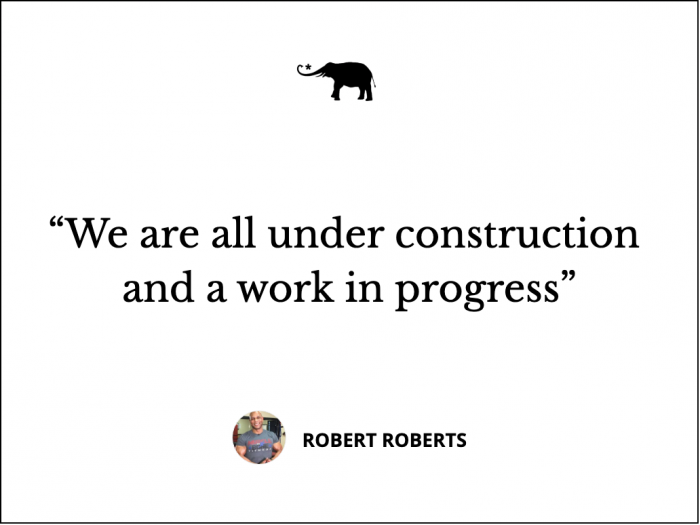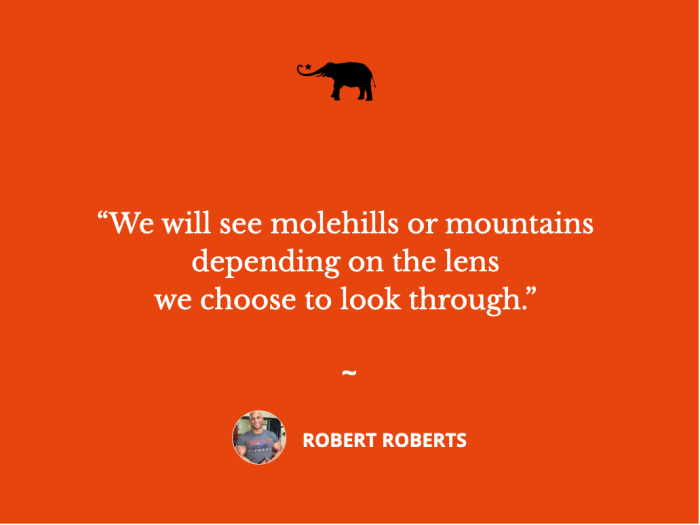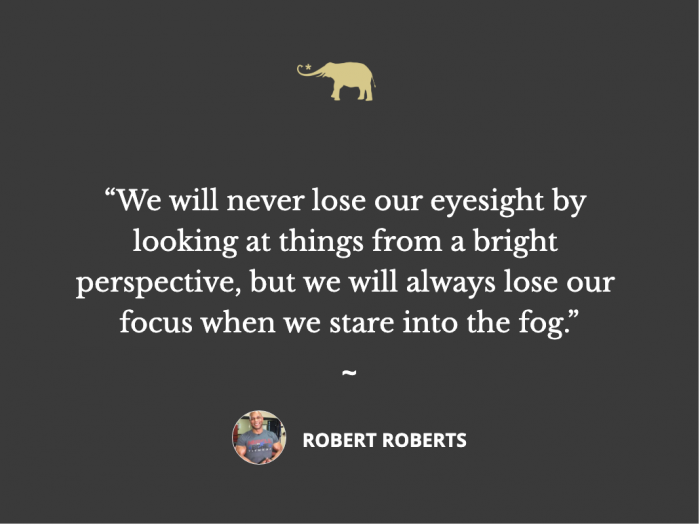In life, we run into situations and circumstances that seem beyond our control and that cause us to have negative self-talk, stress, anxiety, and fear.
We can find a path that will assist us in practicing self-care when we decide to improve our mindfulness.
As we learn how to be honest with ourselves, we will learn to be comfortable when we normally would not. Improving our mindfulness allows us to slow things down and realize that we can control what we can control.
We need to be mindful of the way we see things.
In 1999, I can recall, while standing in a long line at a DMV in upstate New York, observing a man who was approximately five feet in front of me. He appeared to be angry, clenching his jaw, staring at his watch, and vigorously tapping his foot. I saw him look at a large clock that was on the wall. He appeared to get even more upset as he started to roll his eyes and take deep breaths.
I looked back and I saw a different man who was standing approximately 14 people behind me. This man appeared to look up at the clock and to be excited and full of positive energy. He had a big smile on his face and seemed to be happy to be there like he was having a great time.
Both men looked at the same clock and saw two different things.
As we look at the clock in life, what do we see? Is life about the time or about what we do with our time?
As we seek mindfulness, we will become mindful of how we see things.
We are similar to a beautiful glass vase. Sometimes people see the finished product but may not realize that it started off as sand. After sand undergoes an intense process and time, it can be transformed into that beautiful vase.
As we become more mindful, we may realize that we are all a work in progress waiting to be transformed.
We will see molehills or mountains depending on the lens we choose to look through. We need to be mindful of the way we think. The way we think controls our mood, attitude, behavior, choices, actions, and ultimately our destiny.
Emotional intelligence is critical in our capacity to be aware and in control of our emotions; this allows us to develop a better understanding in knowing how to handle our interpersonal relationships empathetically and with good judgment.
Maintaining mindfulness is important. We could dig into the philosophy of psychology and even the theory of mind, simply by changing the way we think. Developing the tools and the skills that we need to have emotional intelligence is imperative.
Say, for example, we are driving down the street and someone cuts us off on the road, and to add insult to injury, we observed them display an obscene and inappropriate hand gesture as they are yelling profane words at us.
At that point, we can have two choices. One, we could choose to get angry, frustrated, or retaliate and possibly have a road rage incident. Two, we could wonder if this person is rushing themself to the hospital and having a medical emergency. Maybe this gentlemen’s wife is in the back seat pregnant, in active labor, and he is not in the right frame of mind.
As we continue to seek mindfulness, we will find ourselves.
We will never lose our eyesight by looking at things from a bright perspective, but we will always lose our focus when we stare into the fog.
When people say that their mind is all over the place, we have to remember that the mind stays still—our focus is what needs to be redirected.
When seeking mindfulness, we need to continue to clear the fog from our lives and our mind. We need to let go of any distractions in our lives that are clouding our vision or that are pulling us away from our path to peace and see life from an optimistic point of view.
By changing the way we think, we will develop emotional intelligence and the skills necessary to have confrontational avoidance. By doing so, we will realize that a bulldog can beat a skunk any day of the week. But the question is, is it really worth the stink?
We have to think of potential problems in our life as an equation. This way, we can find the proper formula for a solution.
We need to be mindful of the way speak.
Words have the power to set us free or to destroy us and everyone around us—as we know, like a rudder on a ship, a person’s tongue is small and can steer someone into calm, warm waters or into a raging storm. A 20-second comment made in anger or frustration could destroy a person’s 30-year career.
Our words are an overflow of our hearts and can lead us to success or failure. Let’s choose to speak life with our words.
Words are like water. They can cool us off and quench our thirst on a hot summer day, or they can come in with the power of a flood and drown us.
We need to be aware of the words that we say to others, as well as the words that we say to ourselves. We need to pay attention to the tension. Sometimes, we need to take a moment to make a conscious effort to listen to ourselves and cross-examine our inner voice to avoid any negative self-talk, which can lead to self-sabotage.
Sometimes, we may hear people say phrases like, “I am such a klutz,” “I’ll never lose this weight,” “I can’t do it—there’s no use,” or “I’ll never be in a relationship.” By saying these words internally or externally, we damage our self-esteem, destroy our confidence, and steal our joy.
We also need to pay particular attention to words and phrases that have a negative connotation associated with them. It’s okay to step away from the flock of ducks and geese and realize that we may be an eagle. It is refreshing and freeing to take a moment to listen to the words that come out of our mouths.
We are all different and valuable at the same time. We are all flawed and perfect, simultaneously.
Know your value, accept the fact that you are different, and embrace it.
We don’t have to laugh at jokes that are not funny—and we don’t have to mimic other people whomake bizarre, antagonistic words and phrases that pacify, appease, dismiss, and discredit others. I have found that these types of words and phrases are usually taught, learned, and in most cases, that person is simply repeating someone else.
For example, remarks like “That’s a lot to unpack” or “let’s unpack this.” If you are not physically unpacking something, this is a catchphrase you are mimicking, and it can offend others that now may feel as if they are being talked at—instead of talked to.
Another phrase that we may need to avoid when speaking to someone or to a group is, “This is not rocket science.” This phrase may be offensive to another person making them feel as if they are inadequate.
People are so much smarter than others take them for. We know and can feel when someone actually cares about us, our well-being, and our circumstances when they are simply going through the motions and putting on a show. The funny thing about putting on the show is that not everyone in the audience will like what they see. In time, the show will be canceled.
When the show is over, how do you want to be remembered? With that being said, let’s choose to be sincere and honest with others and let our words have grace, truth, and love. As we continue, we’ll speak in love and avoid catchwords and phrases that have negative connotations to them.
For instance, if we are on the phone with someone and we had to place them on hold for a moment, when we return back to them, instead of saying, “I’m sorry for the delay,” we could say, “Thank you for your patience.” In this situation, we can simply replace the word sorry with the word thank you.
Say if we made a mistake and missed something, instead of saying, “I’m sorry I missed that,” we could say, “Nice catch—thanks for letting me know.”
Another statement that has a negative connotation is when someone would say at the end of a sentence the phrase “does that make sense” or “if that makes sense.”
I don’t know when people started doing this, but it became catchy when people started to say “if that makes sense.” Not only does that term have a negative connotation associated with it but it creates doubt and uncertainty. This phrase can also cause an emotional trigger in the person who is listening to you. When thinking about communication as it relates to the sender and receiver, it is not just about what you say; it is about how it is received and interpreted.
If a person hears the phrase, “If that makes sense?” said to them, they may feel disrespected. We should try to avoid that term and its variations due to the negative connotation associated with it. One may feel as if someone saying this term is implying that they don’t have the ability to comprehend or understand what they are saying; they may feel belittled, talked down to, degraded, or as if the person saying this term is acting like they are superior.
This statement may also tell the listener that we are not confident and that we may not fully understand the thought or idea that we are trying to convey. Many people may look at the person saying this phrase and its variations as if they are being arrogant, snobbish, condescending, and patronizing.
Instead of saying the phrase, “If that makes sense,” we could simply say, “Let me know if you have any questions.” By saying this, we can practice better mindfulness with our words and have a more positive connotation associated with our speech.
We are all under construction and a work in progress. Once we learn to have patience with ourselves, we will have patience with others.
In order to maintain a positive mindset, we have to put these steps into practice internally so that they can show out externally. It’s like looking for love. Everyone’s trying to look for love, but if you’re not full of love, then you’re not overflowing with it to give it to someone else.
Everyone wants to have a field full of wonderful crops and trees that produce fruit, but not everyone is willing to put in the work to plant the seeds. It’s time for us to stop just going through the motions in life.
Let’s start living life mindfully.
Let’s plow our fields put in the work and plant the seeds, and in due season, we will have a beautiful harvest.
As we continue to live mindfully, we will reexamine how we see, think, and speak.
Every day that we wake up is a gift; this is why it’s called the present. It’s time to give ourselves the gift of peace, love, joy, purpose, and fulfillment by being mindful.
~














Read 0 comments and reply